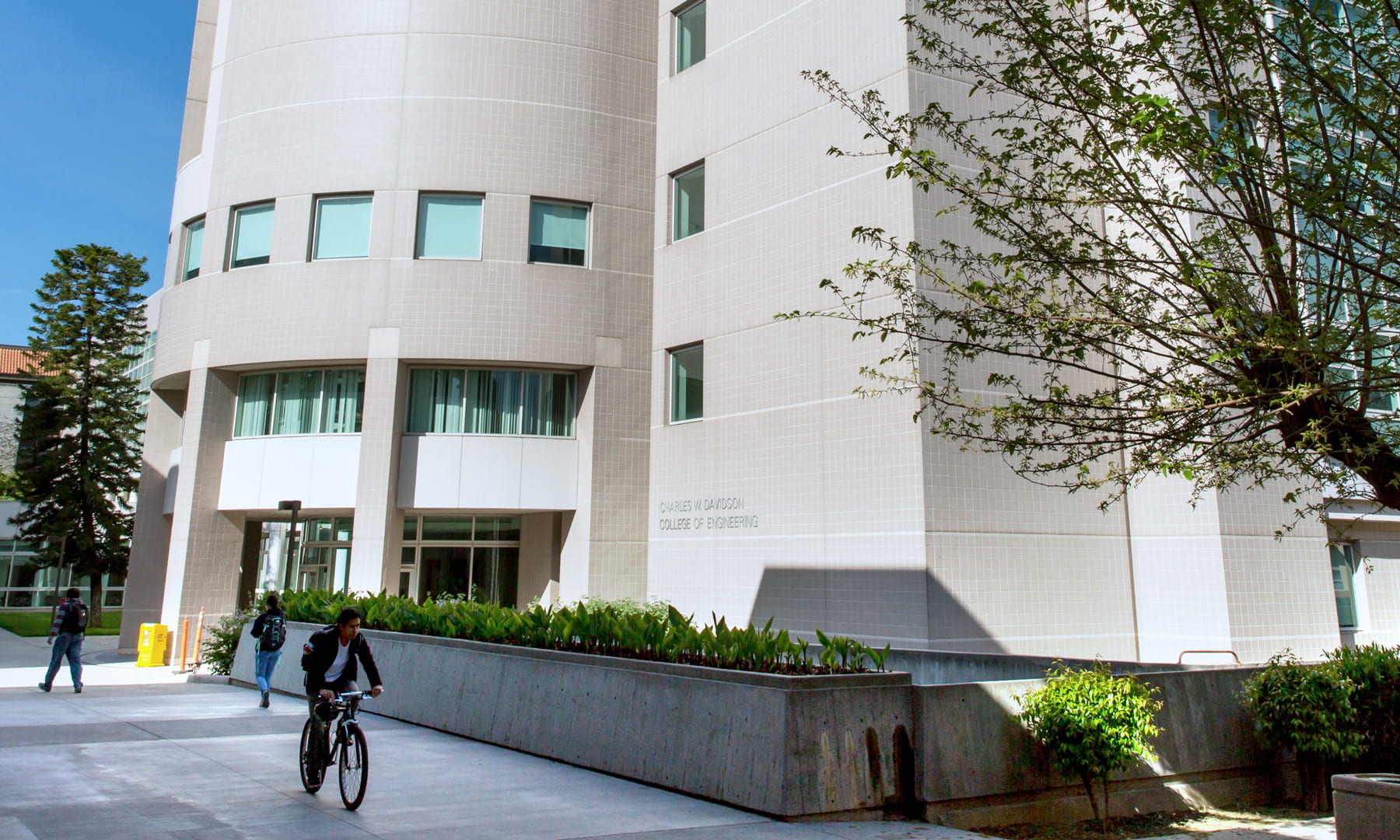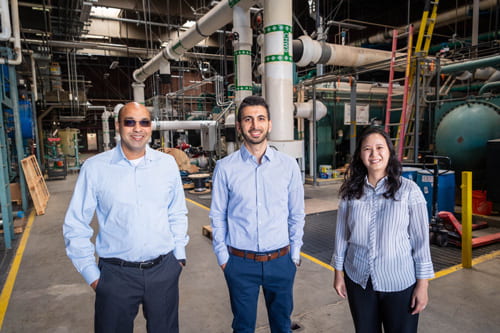SJSU Poised to Contribute to Cleaner, More Cost Efficient Energy Work Within Manufacturing Sector

SJSU’s Charles W. Davidson College of Engineering, featured above, recently won a $1.4 million in federal grant funding as part of a new Department of Energy Advanced Manufacturing Program. Engineering students will be integral to the work that will be accomplished with the award. Photo: David Schmitz
San José State University’s Charles W. Davidson College of Engineering received an important funding award from the U.S. Department of Energy this spring that will allow the college to play a substantive technical role in Silicon Valley’s green energy arena.
A May announcement by the DOE allocated $7 million in funding from the Biden Administration’s Bipartisan Infrastructure Law to expand the Industrial Assessment Center (IAC) program, described in a DOE press release as “a cohort of colleges and universities across the country that help small- and medium-sized manufacturers save energy, improve productivity, and reduce waste by providing no-cost technical assessments.” Over a five-year period, $1.4 million will be directed to SJSU.
Farzan Kazemifar, an assistant professor in SJSU’s Department of Mechanical Engineering, will serve as principal investigator (PI) overseeing the grant program for the university. Together with co-PIs Crystal Han (Department of Mechanical Engineering) and Anil Kumar (Department of Industrial Systems and Engineering), the team will work to help businesses create sustainable and cost-efficient processes and operations through energy savings and reduced waste, goals that also align well with the university’s Office of Sustainability.
Specifically, the funding will provide engineering training for more than 40 students; over 55 assessments of industry energy usage; and a variety of research projects, courses and academic certificates.

(L-R) Anil Kumar, Farzan Kazemifar and Crystal Han will work with SJSU engineering students to help local businesses become “greener” and more energy efficient using the new funding. Photo: Robert C. Bain
“The experience and skills of the investigator team, as well as the support from the college and Division of Research and Innovation, were strong contributing factors that helped SJSU to secure the grant,” Kazemifar said.
Richard Mocarski, SJSU associate vice president for research and vice president of the SJSU Research Foundation Board of Directors, said the grant “will allow SJSU to demonstrate the impact of our faculty and student’s research, scholarship and creative activities to the local and regional community.”
“The program solidifies SJSU’s status as a leader in this space and places us at the forefront of the Silicon Valley energy ecosystem,” Mocarski added.
Supporting federal green energy efforts
The DOE is currently focused on activities that promote energy justice, and the Biden Administration has made its goal of achieving net-zero emissions by 2050 a centerpiece of its energy goals.
This latest federal investment in the IAC program contributes to the administration’s objectives by zeroing in on training opportunities for new and future energy-efficiency workers, and by helping to remove barriers to decarbonization across the manufacturing sector.
“Talented students at America’s schools and universities are showing the manufacturing sector how to save money and cut back on carbon pollution,” said U.S. Secretary of Energy Jennifer M. Granholm in the DOE press release. “The President’s Bipartisan Infrastructure Law is expanding our ability to train the next generation of clean energy engineers and apply their innovations to help small- and medium-sized businesses decarbonize and accelerate America’s transition to a carbon-free future by 2050.”
Providing hands-on opportunities for students
Students in SJSU’s College of Engineering will play an integral role in the ensuing work.
As part of their coursework, for instance, students will be trained to perform energy assessments for small- and medium-sized manufacturing businesses and water/wastewater treatment plants — at no cost to the companies. Students will prepare comprehensive reports and make recommendations to those businesses to help them reduce their waste, energy costs and carbon footprints, and to increase their productivity.
Students will also have summer internship opportunities through partner companies. “Adding to the fine education they already receive at SJSU and our College of Engineering, these students will be particularly well prepared to join the national workforce of energy professionals and will stand out in the job market upon graduation,” said Mocarski.
To help identify appropriate businesses to assist, SJSU has partnered with Community Choice Aggregation power companies, business chambers, manufacturing associations and others to reach qualified businesses. In addition to the free energy assessments, participating businesses will receive guidance on how to implement the recommended improvements in their facilities.
U.S. Representative Zoe Lofgren (CA-19) and U.S. Senator Alex Padilla (CA) were vocal supporters of the effort and praised the expansion of the IAC program, particularly SJSU’s selection as an Industrial Assessment Center.
“I am proud to celebrate the selection of and investment in San José State University as an Industrial Assessment Center,” said Rep. Lofgren, a senior member of the House Science, Space and Technology Committee. “This announcement reaffirms SJSU’s invaluable and continuing role in the development of innovative solutions to the energy, environmental and economic challenges of our day. SJSU is well equipped to help local manufacturers increase energy efficiency, cut costs and lower their carbon footprints to combat climate change. This is good for our environment and good for our economy.”
“We know that building a greener economy requires a well-trained workforce,” added Sen. Padilla. “Creating new centers on these campuses will prepare more Californians to get good paying jobs as we continue to transition to clean energy. DOE’s expansion of Industrial Assessment Centers, including two at California State Universities, is welcome news,” he said.
In addition to SJSU, four other universities, Georgia Institute of Technology, University of Delaware, University of North Texas and San Diego State University, will join the existing cohort of IACs as part of the program’s expansion.
Related Stories

SJSU’s 1857 Minutes of Giving Raises $3.6 Million During Two-Day Campaign

Lucas College and Graduate School of Business Ranked #1 Among Public Undergraduate Business Schools in California and Top 100 in the Nation

SJSU Receives R2 Research Designation

